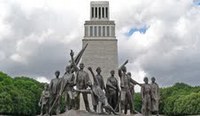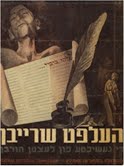Ex-Dictator Is Ordered to Trial in Guatemalan War Crimes Case
1-29-2013
Tuesday, January 29, 2013
Monday, January 28, 2013
Saturday, January 26, 2013
Friday, January 25, 2013
January 27th: International Holocaust Remembrance Day
Memory Since Day One
by Alejandro Baer

On April 19th, 1945, only a few days after American troops had liberated the Buchenwald concentration camp, thousands of survivors gathered at its Appellplatz (the roll call square) and took the following oath: "We will not stop fighting until the last perpetrator is brought before the judges of the people! Our watchword is the destruction of Nazism from its roots. Building a new world of peace and freedom is our goal. This is our responsibility to our murdered comrades and their relatives."
After the Buchenwald Oath was read aloud, the survivors raised their hands and said: "We swear". This was probably the first act of Holocaust memory ever performed.
 A month later, after the war in the European theatre came to an end, the Jewish Historical Commission stepped into action. Charged with preserving a record of the gruesome events, by way of research and documentation, the Commission produced and distributed posters encouraging the survivors in the DP (Displaced Persons) camps to bear witness and to write "the history of the last Churban". With the term Churban, the poster invoked the supreme paradigm of Jewish collective disaster: the destruction of the Temple in Jerusalem.
A month later, after the war in the European theatre came to an end, the Jewish Historical Commission stepped into action. Charged with preserving a record of the gruesome events, by way of research and documentation, the Commission produced and distributed posters encouraging the survivors in the DP (Displaced Persons) camps to bear witness and to write "the history of the last Churban". With the term Churban, the poster invoked the supreme paradigm of Jewish collective disaster: the destruction of the Temple in Jerusalem.
In the Buchenwald Oath, Nazi atrocities fueled a call for broad antifascist resistance. Many of the survivors were socialists, and they believed socialism to be the anti-fascist solution. In the poster addressing Jewish survivors, by contrast, the atrocities were primarily understood as an event in the history of the Jewish people. The Nazis here appeared as the latest in a long succession of murderous outsiders. As I. B. Singer said through a character in one of his books: "Every generation had its Pharaos, Hamans and Chmielnickis. Now it was Hitler".
Jewish and socialist survivors of the Nazi camps were the forerunners of a complex memory culture that is now widely established. However, the Holocaust for long remained a collective memory primarily for the immediate victims. Yom HaShoah (Holocaust Day), on the 27th of the Jewish calendar month of Nissan (April/May) became a central day within the Jewish world.
Only in the 1990s did European countries gradually introduce days of Holocaust remembrance. Some used anniversaries of local events such as the beginning of deportations, the evacuation of ghettos or the introduction of antisemitic legislation. These initiatives turned out to be only first steps toward the establishment, at the onset of the new century, of an international Holocaust Remembrance Day. The date is January 27, the day on which, in 1945, Soviet troops liberated the largest Nazi death camp, Auschwitz-Birkenau. January 27 was thus selected in order to provide a moment of collective annual remembrance across many different countries and to "reaffirm humanity's common aspiration for mutual understanding and justice" (Declaration of the Stockholm International Forum on the Holocaust).
But, can memory be transferred? Can the Holocaust be meaningfully remembered outside the communities that were directly affected by it?
The International Holocaust Remembrance Day is a supranational initiative that encourages states, institutions and individuals worldwide to collectively invoke this European and global symbol of absolute evil -with Auschwitz as its token- and to transform the term Never again into a universal imperative. As such, the Holocaust should render universal human rights, tolerance, and pluralism politically relevant to all who remember this event, particularly those -today a majority- who have no immediate relation to this past.
This year, on the 27th of January, the Holocaust will be commemorated in 35 countries. There is no doubt that the Nazi crimes, epitomized by the term "Holocaust," are not one totalizing signifier containing the same meanings for everyone. As in Buchenwald and in the DP Camps in 1945, today there is not necessarily consensus on how exactly to commemorate the Holocaust.
However, our duty to remember remains untouched. "It happened", wrote the Auschwitz survivor Primo Levi, "therefore it can happen again: this is the core of what we have to say. It can happen, and it can happen everywhere."
by Alejandro Baer

On April 19th, 1945, only a few days after American troops had liberated the Buchenwald concentration camp, thousands of survivors gathered at its Appellplatz (the roll call square) and took the following oath: "We will not stop fighting until the last perpetrator is brought before the judges of the people! Our watchword is the destruction of Nazism from its roots. Building a new world of peace and freedom is our goal. This is our responsibility to our murdered comrades and their relatives."
After the Buchenwald Oath was read aloud, the survivors raised their hands and said: "We swear". This was probably the first act of Holocaust memory ever performed.
 A month later, after the war in the European theatre came to an end, the Jewish Historical Commission stepped into action. Charged with preserving a record of the gruesome events, by way of research and documentation, the Commission produced and distributed posters encouraging the survivors in the DP (Displaced Persons) camps to bear witness and to write "the history of the last Churban". With the term Churban, the poster invoked the supreme paradigm of Jewish collective disaster: the destruction of the Temple in Jerusalem.
A month later, after the war in the European theatre came to an end, the Jewish Historical Commission stepped into action. Charged with preserving a record of the gruesome events, by way of research and documentation, the Commission produced and distributed posters encouraging the survivors in the DP (Displaced Persons) camps to bear witness and to write "the history of the last Churban". With the term Churban, the poster invoked the supreme paradigm of Jewish collective disaster: the destruction of the Temple in Jerusalem.In the Buchenwald Oath, Nazi atrocities fueled a call for broad antifascist resistance. Many of the survivors were socialists, and they believed socialism to be the anti-fascist solution. In the poster addressing Jewish survivors, by contrast, the atrocities were primarily understood as an event in the history of the Jewish people. The Nazis here appeared as the latest in a long succession of murderous outsiders. As I. B. Singer said through a character in one of his books: "Every generation had its Pharaos, Hamans and Chmielnickis. Now it was Hitler".
Jewish and socialist survivors of the Nazi camps were the forerunners of a complex memory culture that is now widely established. However, the Holocaust for long remained a collective memory primarily for the immediate victims. Yom HaShoah (Holocaust Day), on the 27th of the Jewish calendar month of Nissan (April/May) became a central day within the Jewish world.
Only in the 1990s did European countries gradually introduce days of Holocaust remembrance. Some used anniversaries of local events such as the beginning of deportations, the evacuation of ghettos or the introduction of antisemitic legislation. These initiatives turned out to be only first steps toward the establishment, at the onset of the new century, of an international Holocaust Remembrance Day. The date is January 27, the day on which, in 1945, Soviet troops liberated the largest Nazi death camp, Auschwitz-Birkenau. January 27 was thus selected in order to provide a moment of collective annual remembrance across many different countries and to "reaffirm humanity's common aspiration for mutual understanding and justice" (Declaration of the Stockholm International Forum on the Holocaust).
But, can memory be transferred? Can the Holocaust be meaningfully remembered outside the communities that were directly affected by it?
The International Holocaust Remembrance Day is a supranational initiative that encourages states, institutions and individuals worldwide to collectively invoke this European and global symbol of absolute evil -with Auschwitz as its token- and to transform the term Never again into a universal imperative. As such, the Holocaust should render universal human rights, tolerance, and pluralism politically relevant to all who remember this event, particularly those -today a majority- who have no immediate relation to this past.
This year, on the 27th of January, the Holocaust will be commemorated in 35 countries. There is no doubt that the Nazi crimes, epitomized by the term "Holocaust," are not one totalizing signifier containing the same meanings for everyone. As in Buchenwald and in the DP Camps in 1945, today there is not necessarily consensus on how exactly to commemorate the Holocaust.
However, our duty to remember remains untouched. "It happened", wrote the Auschwitz survivor Primo Levi, "therefore it can happen again: this is the core of what we have to say. It can happen, and it can happen everywhere."
Monday, January 21, 2013
Sociology Ph.D. Candidate Hollie Nyseth Brehm to Present at CHGS Workshop
Interdisciplinary Workshop for Graduate Students and Faculty Holocaust, Genocide and Mass Violence Studies
Friday, January 25, 2013
12:00 p.m. - 1:30 p.m.
Room 710 Social Sciences Building
Hollie Nyseth Brehm will focus on two concurrent projects that she is pursuing, including her dissertation and a collaborative effort with Dr. Chris Uggen (Sociology). Both projects seek to better understand aspects of genocide. On Friday she will focus on the case of Rwanda and explore why certain regions in Rwanda saw more killings as well as why violence started comparatively earlier in some regions.
Read Hollie Nyseth Brehm's article The Crime of Genocide as seen in the CHGS December newsletter, posted on the Society Pages by clicking here.
If you are interested in participating in the workshop please contact Shannon Golden .
Updated schedule: CHGS Workshop schedule 1-21-2013.pdf
Friday, January 25, 2013
12:00 p.m. - 1:30 p.m.
Room 710 Social Sciences Building
Hollie Nyseth Brehm will focus on two concurrent projects that she is pursuing, including her dissertation and a collaborative effort with Dr. Chris Uggen (Sociology). Both projects seek to better understand aspects of genocide. On Friday she will focus on the case of Rwanda and explore why certain regions in Rwanda saw more killings as well as why violence started comparatively earlier in some regions.
Read Hollie Nyseth Brehm's article The Crime of Genocide as seen in the CHGS December newsletter, posted on the Society Pages by clicking here.
If you are interested in participating in the workshop please contact Shannon Golden .
Updated schedule: CHGS Workshop schedule 1-21-2013.pdf
Subscribe to:
Comments (Atom)
© Regents of the University of Minnesota. All rights reserved. Equal opportunity educator and employer.